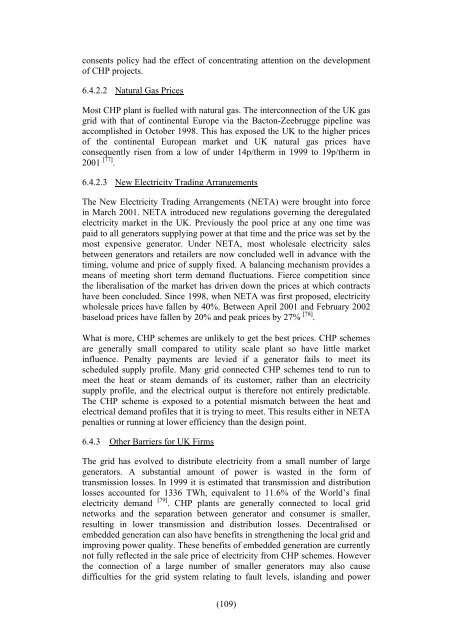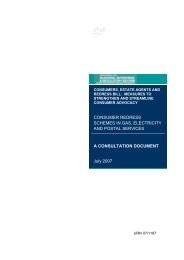(70) Therefore, the risk of sulphuric acid dew point attack ... - DTI Home
(70) Therefore, the risk of sulphuric acid dew point attack ... - DTI Home
(70) Therefore, the risk of sulphuric acid dew point attack ... - DTI Home
Create successful ePaper yourself
Turn your PDF publications into a flip-book with our unique Google optimized e-Paper software.
consents policy had <strong>the</strong> effect <strong>of</strong> concentrating attention on <strong>the</strong> development<br />
<strong>of</strong> CHP projects.<br />
6.4.2.2 Natural Gas Prices<br />
Most CHP plant is fuelled with natural gas. The interconnection <strong>of</strong> <strong>the</strong> UK gas<br />
grid with that <strong>of</strong> continental Europe via <strong>the</strong> Bacton-Zeebrugge pipeline was<br />
accomplished in October 1998. This has exposed <strong>the</strong> UK to <strong>the</strong> higher prices<br />
<strong>of</strong> <strong>the</strong> continental European market and UK natural gas prices have<br />
consequently risen from a low <strong>of</strong> under 14p/<strong>the</strong>rm in 1999 to 19p/<strong>the</strong>rm in<br />
2001 [77] .<br />
6.4.2.3 New Electricity Trading Arrangements<br />
The New Electricity Trading Arrangements (NETA) were brought into force<br />
in March 2001. NETA introduced new regulations governing <strong>the</strong> deregulated<br />
electricity market in <strong>the</strong> UK. Previously <strong>the</strong> pool price at any one time was<br />
paid to all generators supplying power at that time and <strong>the</strong> price was set by <strong>the</strong><br />
most expensive generator. Under NETA, most wholesale electricity sales<br />
between generators and retailers are now concluded well in advance with <strong>the</strong><br />
timing, volume and price <strong>of</strong> supply fixed. A balancing mechanism provides a<br />
means <strong>of</strong> meeting short term demand fluctuations. Fierce competition since<br />
<strong>the</strong> liberalisation <strong>of</strong> <strong>the</strong> market has driven down <strong>the</strong> prices at which contracts<br />
have been concluded. Since 1998, when NETA was first proposed, electricity<br />
wholesale prices have fallen by 40%. Between April 2001 and February 2002<br />
baseload prices have fallen by 20% and peak prices by 27% [78] .<br />
What is more, CHP schemes are unlikely to get <strong>the</strong> best prices. CHP schemes<br />
are generally small compared to utility scale plant so have little market<br />
influence. Penalty payments are levied if a generator fails to meet its<br />
scheduled supply pr<strong>of</strong>ile. Many grid connected CHP schemes tend to run to<br />
meet <strong>the</strong> heat or steam demands <strong>of</strong> its customer, ra<strong>the</strong>r than an electricity<br />
supply pr<strong>of</strong>ile, and <strong>the</strong> electrical output is <strong>the</strong>refore not entirely predictable.<br />
The CHP scheme is exposed to a potential mismatch between <strong>the</strong> heat and<br />
electrical demand pr<strong>of</strong>iles that it is trying to meet. This results ei<strong>the</strong>r in NETA<br />
penalties or running at lower efficiency than <strong>the</strong> design <strong>point</strong>.<br />
6.4.3 O<strong>the</strong>r Barriers for UK Firms<br />
The grid has evolved to distribute electricity from a small number <strong>of</strong> large<br />
generators. A substantial amount <strong>of</strong> power is wasted in <strong>the</strong> form <strong>of</strong><br />
transmission losses. In 1999 it is estimated that transmission and distribution<br />
losses accounted for 1336 TWh, equivalent to 11.6% <strong>of</strong> <strong>the</strong> World’s final<br />
electricity demand [79] . CHP plants are generally connected to local grid<br />
networks and <strong>the</strong> separation between generator and consumer is smaller,<br />
resulting in lower transmission and distribution losses. Decentralised or<br />
embedded generation can also have benefits in streng<strong>the</strong>ning <strong>the</strong> local grid and<br />
improving power quality. These benefits <strong>of</strong> embedded generation are currently<br />
not fully reflected in <strong>the</strong> sale price <strong>of</strong> electricity from CHP schemes. However<br />
<strong>the</strong> connection <strong>of</strong> a large number <strong>of</strong> smaller generators may also cause<br />
difficulties for <strong>the</strong> grid system relating to fault levels, islanding and power<br />
(109)
















